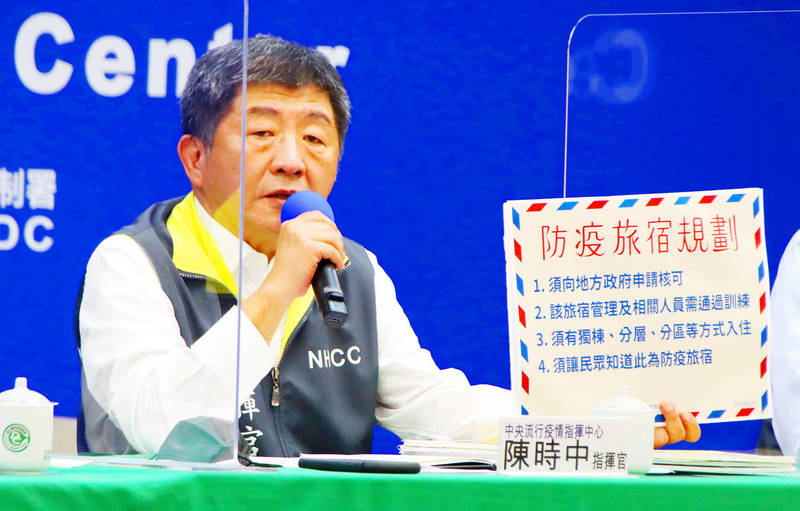《TAIPEI TIMES》 Mass testing ‘could swamp the system’

Minister of Health and Welfare Chen Shih-chung speaks at a Central Epidemic Command Center news briefing in Taipei on Wednesday. Photo provided by the Central Epidemic Command Center via CNA
POLICY EXPLAINED: The head of the CECC said that mass testing would have produced 12,475 false-positives, overwhelming the healthcare system, causing community spread
By Lee I-chia / Staff reporter
Mass testing for COVID-19 on all travelers arriving in Taiwan could overwhelm the nation’s healthcare system, the Central Epidemic Command Center (CECC) said yesterday as it reported a new confirmed case, a Taiwanese who had returned from Mexico.
Minister of Health and Welfare Chen Shih-chung (陳時中), who heads the center, said that in the past few days the public has been widely debating the Changhua County Public Health Bureau’s testing policy, so he used a simulated scenario to explain why mass testing is not the best policy at this moment.
The bureau was found to have asked many people who had returned from other countries and were still under 14-day home quarantine to be tested for COVID-19, despite having no symptoms, which does not align with the CECC’s policy of only arranging for people in quarantine to be tested if they show symptoms.
The bureau’s actions were revealed when the CECC on Monday reported that a Taiwanese teenager living in the US had tested positive on his 10th day of quarantine after returning for a family visit, even though he had no symptoms.
The case sparked controversy as Chen on Monday ordered the Department of Civil Service Ethics to launch an investigation to clarify the situation.
“People have been asking: ‘What is wrong with doing a little more [testing]?” in the past couple of days,” Chen said yesterday. “There is nothing wrong doing a little more if it is proper disease prevention, but if there are flaws in the process, it could result in a big problem.”
Since January about 250,000 people have been put under home isolation or quarantine after arriving in Taiwan, Chen said.
Using 0.2 percent as the prevalence rate — the median of COVID-19 prevalence rates in other countries — and a test kit with 90 percent sensitivity and 95 percent specificity to simulate mass testing on all the arriving travelers, there would be about 500 infected people, but only 450 of them would be detected, he said.
“Mass testing would result in 50 false-negative cases — infected people who tested as negative,” Chen said. “If people who tested negative are allowed to return home without quarantine, then the 50 false-negative cases being allowed to freely move around would most likely cause community spread.”
“Therefore, we know even if mass testing is conducted, mandatory quarantine is still necessary,” he said.
However, if a policy of mass testing following a 14-day quarantine is implemented, there would be about 12,475 false-positive cases — people who were not infected but tested positive, Chen said.
He said that the 12,475 false-positive cases would be hospitalized for about five to six days and would only be released from isolation after they tested negative twice consecutively, which would overwhelm healthcare capacity that should be preserved for people who actually need medical treatment.
The 12,475 people who were not infected would be placed in hospitals, which are high-risk environments, he said.
Contact tracing would need to be conducted on all 12,475 false-positive cases, which might result in all airline crew members being placed under home isolation, he added.
“From the disease situations in other countries, we known that once the healthcare system is overwhelmed, community spread will begin, because infected people cannot be hospitalized and have to go back into local communities,” Chen said.
He added that he is worried about the argument that “doing more testing would allow those who tested negative and their family members to feel safe,” because it does not mean that a person is immune to COVID-19, and sometimes a test result is negative because the person’s viral load was low at the time of testing.
“If people who test negative let their guard down, the risk of infection will increase,” Chen said, adding that it would cost about NT$800 million (US$27.1 million) if all 250,000 arriving travelers were tested, but the risk of local infection would increase.
Meanwhile, the new imported case reported yesterday is a woman in her 20s, who traveled to Mexico for work in late January and returned to Taiwan on Wednesday, the CECC said.
Ten passengers who sat near her during the flight back to Taiwan have been placed under home isolation, it said.
Fifteen crew members, who wore protective gear during the flight, would practice self-health management, it added.
新聞來源:TAIPEI TIMES
















